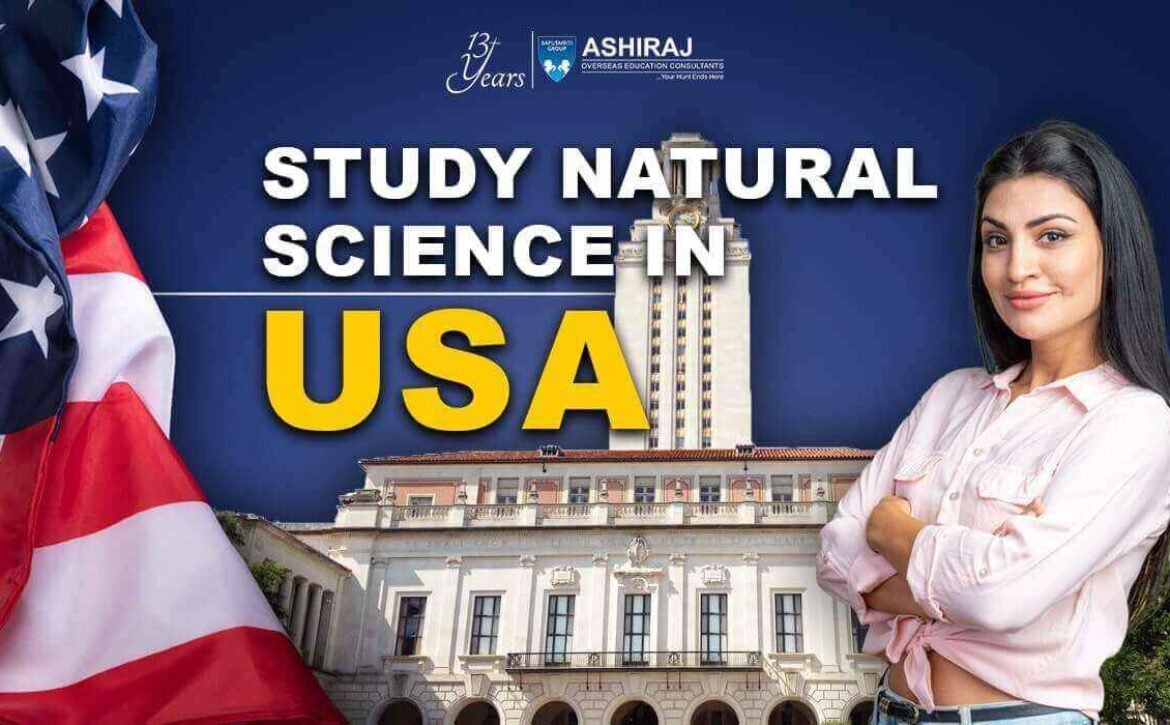
Natural Science in USA
Natural Science in the USA encompasses a vast and dynamic realm of exploration, spanning disciplines such as physics, chemistry, biology, and earth sciences. The United States stands as a global powerhouse in scientific research and innovation, with renowned institutions and brilliant minds pushing the boundaries of knowledge. From the intricacies of particle physics to the mysteries of the human genome, American scientists contribute significantly to our understanding of the natural world.
In the landscape of Natural Science in the USA, research institutions like NASA, the National Institutes of Health (NIH), and esteemed universities play pivotal roles. These institutions foster a collaborative environment where breakthroughs in medicine, environmental science, and technology are not only encouraged but expected. The phrase Natural Science in USA encapsulates a narrative of discovery, where the pursuit of knowledge is both a national priority and a testament to the spirit of exploration that defines American scientific endeavors.
Why to Study Natural Science in USA?
- World-Class Institutions: The USA boasts top-tier universities and research institutions renowned for their cutting-edge contributions to Natural Science. Pursuing studies here means tapping into a wealth of resources and expertise.
- Diverse Research Opportunities: From exploring marine ecosystems to delving into astrophysics, the breadth of Natural Science research in the USA is unparalleled. Students can choose from a wide array of specialties, ensuring a tailored and enriching academic experience.
- Innovation Hub: The USA is a global hub for scientific innovation, fostering an environment that encourages out-of-the-box thinking. Studying here means being at the forefront of groundbreaking discoveries and technological advancements.
- Global Collaboration: Natural Science transcends borders, and studying in the USA provides opportunities for collaboration with international peers and experts. This interconnectedness enhances the learning experience and widens perspectives.
- State-of-the-Art Facilities: Access to state-of-the-art laboratories, observatories, and research facilities is integral to studying Natural Science in the USA. Students can engage in hands-on experiments and projects that shape the future of their field.
In summary, choosing to study Natural Science in the USA opens doors to a world of possibilities, offering unparalleled educational experiences, research opportunities, and a chance to contribute to the global scientific landscape. The phrase Natural Science in USA encapsulates the essence of a scientific journey that transcends boundaries and pushes the boundaries of knowledge.
Top Universities to Study Natural Science in USA
University | QS World University Ranking 2023 | Type of University | Average Annual Fees | Programs Offered |
Massachusetts Institute of Technology (MIT) | 1 | Private Research | $53,790 | Physics, Chemistry, Biology, Earth Sciences |
Stanford University | 2 | Private Research | $56,169 | Environmental Science, Astrophysics, Biochemistry |
Harvard University | 3 | Private Ivy League | $51,904 | Physics, Genetics, Geology, Atmospheric Sciences |
California Institute of Technology (Caltech) | 4 | Private Research | $56,862 | Chemical Engineering, Astronomy, Geophysics |
Princeton University | 5 | Private Ivy League | $53,770 | Ecology and Evolutionary Biology, Atmospheric Science |
Studying Natural Science in the USA is a compelling choice, especially considering the world-class universities that dominate the QS World University Rankings 2023. MIT, securing the top spot, offers diverse programs in Physics, Chemistry, Biology, and Earth Sciences. Stanford University, known for its research excellence, provides opportunities in Environmental Science, Astrophysics, and Biochemistry. Harvard University, a prestigious Ivy League institution, covers a wide spectrum of natural sciences, including Physics, Genetics, Geology, and Atmospheric Sciences. Caltech, standing at fourth place, specializes in Chemical Engineering, Astronomy, and Geophysics. Princeton University, securing the fifth position, excels in programs like Ecology and Evolutionary Biology, as well as Atmospheric Science. With average annual fees and unparalleled program offerings, these universities underscore the appeal of pursuing Natural Science in the USA. The phrase Natural Science in USA resonates strongly with the academic excellence and diverse opportunities available at these institutions.
Course Curriculum for Natural Science in USA
- Interdisciplinary Approach: The course curriculum for Natural Science in the USA emphasizes an interdisciplinary approach, allowing students to explore connections between various scientific disciplines.
- Core Foundation: Students typically start with a solid foundation in core sciences such as Physics, Chemistry, Biology, and Mathematics, providing a comprehensive understanding of the fundamental principles.
- Elective Specializations: As students progress, they have the flexibility to choose elective courses based on their interests. Specializations may include Environmental Science, Astrophysics, Biochemistry, and more.
- Hands-On Labs: Practical application is a key component, with hands-on laboratory work enabling students to apply theoretical knowledge and develop crucial research skills.
- Research Opportunities: Many programs integrate research opportunities, allowing students to engage in cutting-edge projects and contribute to the advancement of scientific knowledge.
- Capstone Projects: Culminating the curriculum, capstone projects often involve independent research, encouraging students to demonstrate their mastery of the subject and contribute original insights.
Studying Natural Science in the USA offers a curriculum designed to foster curiosity, critical thinking, and innovation. The phrase Natural Science in USA encapsulates the essence of a holistic educational journey that equips students with the skills and knowledge to address complex scientific challenges.
Eligibility Criteria & Admission Requirements for Natural Science in USA
- IELTS or TOEFL Scores:
IELTS: Minimum overall score of 6.5, with no individual band score below 6.0.
TOEFL: Minimum overall score of 80, with at least 20 in each section.
- GRE or GMAT Scores:
GRE: Competitive scores in the Quantitative and Verbal sections, typically varying by university but often around 160 in each section.
GMAT: Scores around 650 are considered competitive, though requirements may vary.
- Academic Certificates:
A Bachelor’s degree in a relevant field of Natural Science with a strong academic record is typically required.
- Work Experience:
While work experience is not always mandatory, some programs may prefer or require relevant research or professional experience.
- Passport & Student Visa:
A valid passport is essential for international students. Obtaining a student visa involves submitting an acceptance letter from the university, proof of financial capability, and completing the necessary visa application processes.
Admission into Natural Science programs in the USA is competitive and requires a holistic evaluation of academic achievements, language proficiency, and standardized test scores. The phrase Natural Science in USA encapsulates not just the academic rigor of the programs but also the thorough eligibility criteria that ensure students are well-prepared for the challenges of scientific exploration in a global context.
Documents Required for Studying Natural Science in USA
- Passport:
A valid passport is essential for international students intending to pursue Natural Science programs in the USA.
- Letters of Recommendation (LOR):
Typically, two LORs from academic or professional references are required to assess the applicant’s qualifications and potential for success in the program.
- Statement of Purpose (SOP):
An SOP outlines the applicant’s academic and career goals, providing insights into their motivations and aspirations for pursuing Natural Science in the USA.
- Curriculum Vitae (CV):
A comprehensive CV highlighting academic achievements, research experience, and relevant skills.
- Official High School Transcripts:
Transcripts reflecting the applicant’s high school academic performance are necessary for undergraduate admissions.
- Educational Certificates:
Certificates from previous educational institutions, especially for postgraduate programs, are crucial to assessing academic qualifications.
- Work Experience Certificate:
If applicable, a certificate detailing relevant work experience in the field of Natural Science enhances the application.
- Proof of Financial Resources:
Demonstrating the ability to cover tuition, living expenses, and other costs is vital. This may include bank statements, scholarship award letters, or financial guarantees.
Preparing a thorough set of documents is a crucial step in the application process for Natural Science in the USA. The phrase Natural Science in USA signifies not just the academic journey but also the meticulous documentation required to embark on this scientific exploration in the United States.
Admission Process for Natural Science in USA
- Research and Choose Programs:
Explore Natural Science programs in the USA, considering factors like faculty expertise, research opportunities, and program specialties.
- Check Eligibility Requirements:
Review admission criteria, including academic qualifications, standardized test scores (GRE/GMAT, IELTS/TOEFL), and any specific prerequisites.
- Prepare Required Documents:
Gather essential documents, including transcripts, letters of recommendation, statement of purpose, curriculum vitae, and proof of financial resources.
- Take Standardized Tests:
Register and take required standardized tests such as GRE or GMAT for postgraduate programs and IELTS or TOEFL for English language proficiency.
- Submit Online Application:
Complete the online application form for the selected universities, providing accurate and detailed information.
- Pay Application Fees:
Pay the application fees for each university. Fee amounts vary, so ensure compliance with the respective university’s requirements.
- Wait for Admission Decision:
Patiently await the admission decision. This period may vary across universities but typically involves a thorough review of submitted documents.
- Accept Offer and Obtain Student Visa:
Upon receiving an acceptance letter, confirm acceptance, and initiate the process of obtaining a student visa.
The admission process for Natural Science in the USA involves careful planning, thorough documentation, and adherence to university-specific requirements. The phrase Natural Science in USA signifies not only the field of study but also the procedural steps one must navigate to embark on this scientific journey in the United States.
“Education is the most powerful weapon which you can use to change the world.”
Nelson Mandela
Cost of Natural Science Course in USA
- Tuition Fees:
Tuition fees for Natural Science programs vary widely. On average, they range from $20,000 to $50,000 per year for undergraduate programs and can go higher for postgraduate studies.
- Living Expenses:
Consider the cost of living, including accommodation, meals, transportation, and miscellaneous expenses. This varies based on the city and lifestyle but is generally estimated at $15,000 to $20,000 annually.
- Books and Supplies:
Allocate funds for textbooks, laboratory supplies, and other academic materials. This may amount to a few hundred to a couple of thousand dollars per year.
- Health Insurance:
International students are often required to have health insurance. Plan for an additional $1,000 to $3,000 per year, depending on the coverage.
- Miscellaneous Costs:
- Budget for personal expenses, entertainment, and unforeseen expenditures. This can range from $2,000 to $5,000 annually.
- Total Estimated Cost:
The total cost of studying Natural Science in the USA can range from $40,000 to $80,000 per year, covering tuition, living expenses, and additional costs.
Understanding and planning for these costs is crucial for prospective students. The phrase Natural Science in USA not only signifies an academic pursuit but also involves financial considerations for a successful and enriching educational experience in the United States.
Scholarships for Natural Science Courses in USA
Scholarship Name | Eligibility Criteria | Amount | Application Deadline |
Merit-Based Scholarships | Outstanding academic achievements in Natural Science | Varies | Varies by University |
Research Fellowships | Demonstrated research potential and contributions | $5,000 to $20,000 | Rolling or Annual Deadlines |
STEM Diversity Scholarships | Encouraging diversity in STEM fields | $2,000 to $10,000 | Varies by Scholarship Program |
Need-Based Financial Aid | Documented financial need and academic merit | Varies | Varies by University |
International Student Grants | For outstanding international students | $1,000 to $5,000 | Varies by University |
Scholarships for Natural Science in the USA provide financial support to deserving students pursuing academic excellence. Merit-based scholarships are available for those with exceptional academic achievements, while research fellowships reward contributions to scientific research. STEM diversity scholarships aim to encourage inclusivity, and need-based financial aid ensures access for students with financial constraints. International student grants recognize and support outstanding individuals from around the world. The phrase Natural Science in USA not only represents a field of study but also signifies the opportunities available for students to alleviate financial burdens and pursue their scientific aspirations in the United States. Applicants should carefully review eligibility criteria, amounts, and deadlines to make informed decisions about scholarship applications.
Career Opportunities After Natural Science in USA
Job Profile | Description | Average Salary |
Research Scientist | Conducts experiments, analyzes data, and contributes to research | $80,000 to $120,000 |
Environmental Scientist | Studies and monitors environmental issues and solutions | $60,000 to $90,000 |
Data Scientist | Analyzes and interprets complex data for decision-making | $90,000 to $130,000 |
Biotechnologist | Applies biological principles to develop new technologies | $70,000 to $100,000 |
Astrophysicist | Studies celestial bodies, their properties, and interactions | $80,000 to $120,000 |
Natural Science graduates in the USA have diverse and lucrative career opportunities. Research scientists engage in cutting-edge experiments, contributing to advancements in their field, with average salaries ranging from $80,000 to $120,000. Environmental scientists focus on monitoring and solving environmental issues, earning an average salary of $60,000 to $90,000. Data scientists, in high demand across industries, analyze complex data for decision-making, with salaries averaging $90,000 to $130,000. Biotechnologists apply biological principles to develop technologies, earning $70,000 to $100,000. Astrophysicists, exploring celestial bodies, earn salaries ranging from $80,000 to $120,000. The phrase Natural Science in USA not only represents an academic pursuit but also signifies a pathway to rewarding and impactful careers with competitive salaries in the United States. Students can tailor their career paths based on interests and specializations within the diverse field of Natural Science.
Frequently Asked Questions About Natural Science in USA
Natural Science encompasses disciplines like physics, chemistry, biology, and more. Studying in the USA offers access to top-notch institutions and diverse research opportunities, contributing to global scientific advancements.
Yes, numerous scholarships exist, including merit-based, research fellowships, STEM diversity scholarships, and need-based financial aid. Amounts and eligibility criteria vary.
Eligibility criteria include a relevant bachelor’s degree, standardized test scores (GRE/GMAT, IELTS/TOEFL), letters of recommendation, statement of purpose, and proof of financial resources.
Costs vary, including tuition fees (average $20,000-$50,000), living expenses ($15,000-$20,000), books and supplies, health insurance, and miscellaneous expenses.
Required documents include a valid passport, letters of recommendation, statement of purpose, curriculum vitae, official transcripts, educational certificates, work experience certificate, and proof of financial resources.
Yes, international students on F-1 visas can work on-campus part-time during the academic year and full-time during designated breaks.
Career options include roles such as research scientist, environmental scientist, data scientist, biotechnologist, and astrophysicist, with salaries ranging from $60,000 to $130,000.
Yes, most universities require either IELTS or TOEFL scores to assess the English language proficiency of international applicants.
Universities often assist in finding on-campus or nearby housing. Online platforms and community groups are also helpful in locating suitable accommodation.
The process involves researching and choosing programs, checking eligibility requirements, preparing required documents, taking standardized tests (GRE/GMAT, IELTS/TOEFL), submitting online applications, paying application fees, awaiting admission decisions, and accepting offers before obtaining a student visa.




